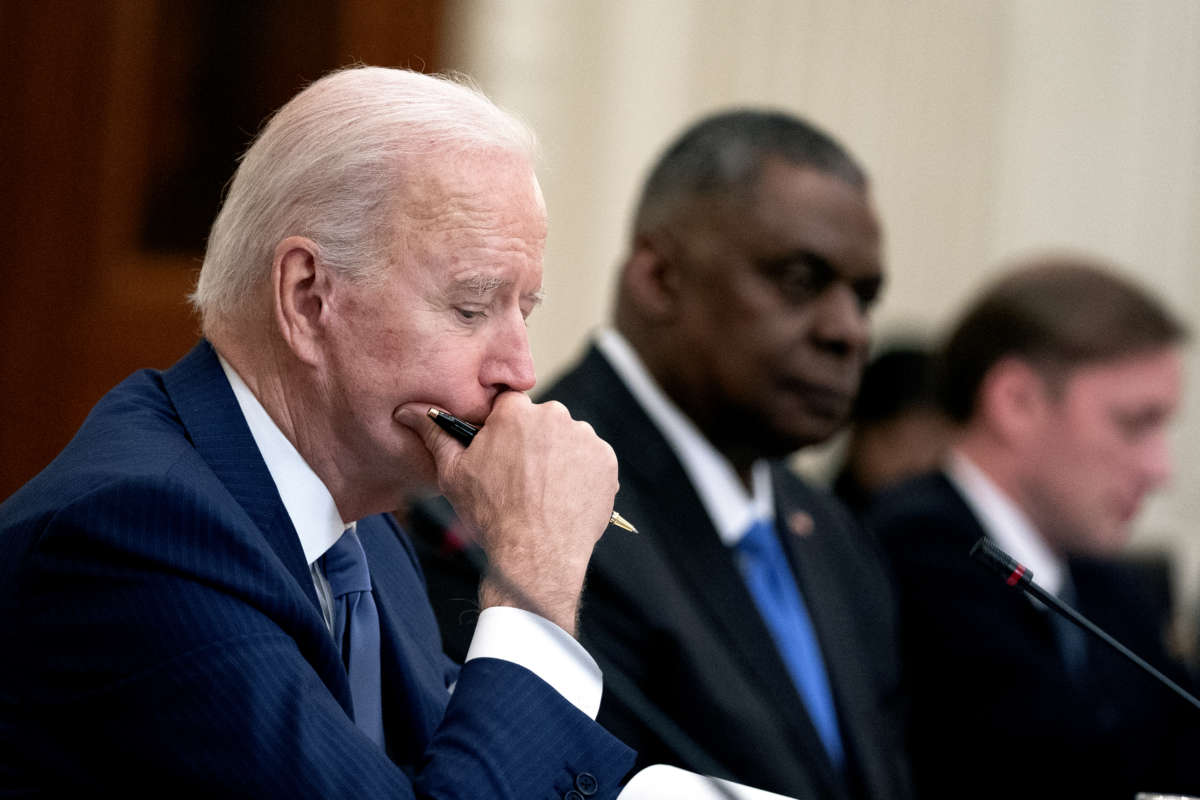President Joe Biden is set to meet with Republican Sen. Shelley Moore Capito (West Virginia) on Wednesday to further discuss a bipartisan deal on his infrastructure proposal. But, as Democrats and progressives have exasperatedly reminded the president, bipartisanship with Republicans on large proposals has proven to be nearly impossible.
The president has extended the talks with Republican senators on the bill into this month. While the White House has already cut their infrastructure offer by about $600 billion in negotiations, Republicans have offered a proposal that’s a small fraction of the Democrats’ proposal. Biden’s current proposal is a $1.7 trillion bill, all in new spending; the GOP’s offer for new spending is only $257 billion.
Democrats and progressives have grown frustrated with the protracted negotiations, and Transportation Secretary Pete Buttigieg has said that the administration is soon approaching a “fish-or-cut-bait” moment, since the process “can’t go on forever.”
But Biden is insistent that the negotiations process is necessary and healthy. Politico reported Tuesday that “In the White House there is a belief that the public will reward the president for reaching a bipartisan agreement on infrastructure.”
Perhaps that would be true if the Republicans were interested in the same — but, as progressives and Democrats are pointing out, Republicans haven’t proven themselves to be good faith negotiators.
“Time is tick, tick, ticking past. Every day spent on hopeless bipartisanship is a day not spent on climate,” said Sen. Sheldon Whitehouse (D-Rhode Island) on Twitter. “We can survive bumpy roads; a ruined planet is for eons.”
Democrats also point out that abolishing the filibuster would make it possible for them to actually use their majority in Congress and the White House.
“Instead of wasting our energy negotiating against ourselves for an infrastructure package that Republicans clearly have no interest in passing, let’s put our energy into abolishing the filibuster, passing the policy we were elected to deliver” wrote Rep. Cori Bush (D-Missouri) on Twitter.
Indeed, the filibuster has earned a huge amount of ire from the left in recent months, and its two main defenders in the Senate were even ribbed, seemingly, by the president.
“I hear all the folks on TV saying, ‘Why doesn’t Biden get this done?’ Well, Biden only has a majority, effectively, of four votes in the House and a tie in the Senate, with two members of the Senate who vote more with my Republican friends,” said Biden during remarks on Tuesday. “But we’re not giving up.”
Many pundits and political journalists have interpreted this comment to refer to Senators Joe Manchin (D-West Virginia) and Kyrsten Sinema (D-Arizona). Biden’s not wrong about their voting records: according to a FiveThirtyEight tracker of how often legislators voted with President Donald Trump, Manchin and Sinema are among four Democrats in the Senate who voted with Republicans the most during Trump’s tenure.
Manchin and Sinema are also both still vehemently in favor of keeping the filibuster, even as progressives warn that keeping the filibuster — and not passing any meaningful Democratic legislation — could cost Democrats big time in the midterms and in 2024.
“The American people want action, not never-ending ‘negotiations’ and obstructionism, and they will not come out and vote for a party that does not deliver,” tweeted Sen. Bernie Sanders (I-Vermont). “If not now, when?”
Join us in defending the truth before it’s too late
The future of independent journalism is uncertain, and the consequences of losing it are too grave to ignore. To ensure Truthout remains safe, strong, and free, we need to raise $24,000 by the end of today. Every dollar raised goes directly toward the costs of producing news you can trust.
Please give what you can — because by supporting us with a tax-deductible donation, you’re not just preserving a source of news, you’re helping to safeguard what’s left of our democracy.
